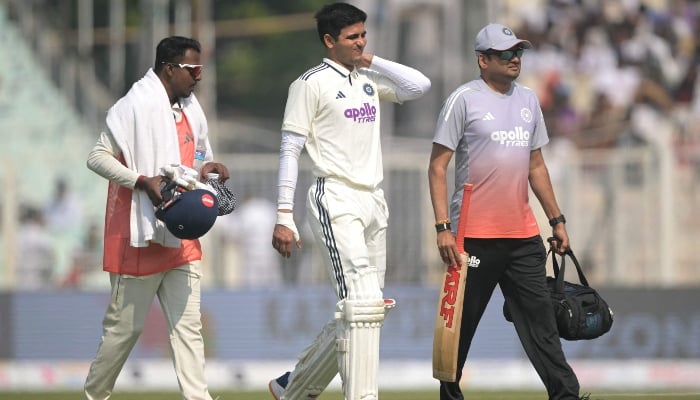
KOLKATA: India captain Shubman Gill was “under observation” in hospital on Sunday after suffering neck pain and will not participate further in the first Test against South Africa.
Top-order batsman Gill felt pain in his neck after scoring a boundary on Saturday in Kolkata on the second day and left the field.
Gill “was taken to hospital for examination after the end of the day’s play,” the Board of Control for Cricket in India (BCCI) said on Sunday, before the start of the third day.
“He is currently under observation in the hospital. He will not participate further in the Test match. He will continue to be monitored by the BCCI medical team.”
The first match of the two-Test series is likely to end on the third day at Eden Gardens on Sunday, with South Africa resuming at 93-7 in their second innings, a lead of just 63 runs, on a tough batting wicket.
Gill faces a battle to be fit and lead the team in the second Test in Guwahati, which will begin in six days’ time on November 22.
Veteran spinner Ravindra Jadeja took four wickets to put India within sight of victory on a frenetic second day of a low-scoring opening Test on Saturday.
South Africa were 93-7 at stumps to lead by 63 runs in their second innings on an Eden Gardens pitch that has made batting decidedly tricky.
Fifteen wickets fell on the second day and KL Rahul’s 39 (off 119 balls) in India’s first innings remains the highest individual score of the match.
Proteas captain Temba Bavuma attempted to replicate Rahul’s stubbornness, posting an unbeaten 29 points. Corbin Bosch, one, was with him when the game was suspended due to poor lighting.
Spinner Simon Harmer had dragged the visitors back into the contest with figures of 4-30 that helped them bowl out India for 189 with the hosts taking a slender lead of 30.
“Playing in India you know you will be under pressure and I think we counter-attacked well today by restricting them,” Harmer told reporters.
“Cricket is a fun game, we could be sitting here tomorrow night with a completely different story. South Africa managed to get to 150 and India got past 80.”
“If there’s one thing this team has proven, it’s that they can fight when their backs are against the wall,” Harmer added.



